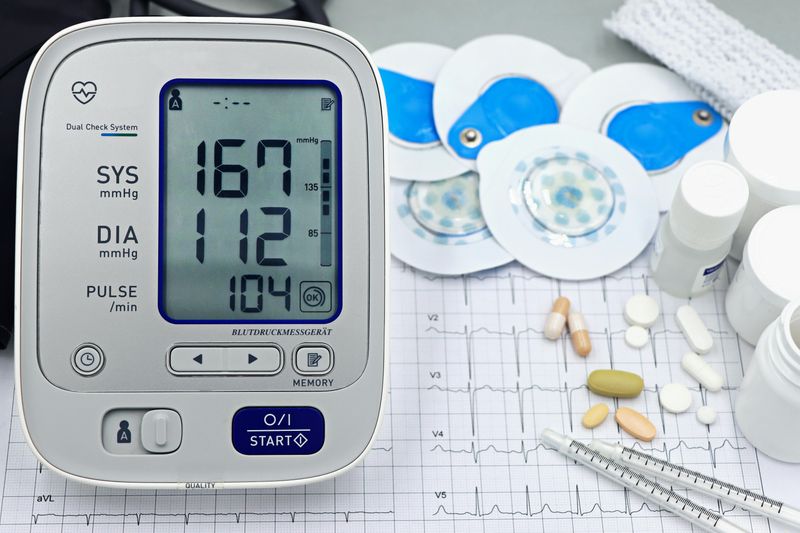Our bodies are brilliant at sending us warning signals when stress levels reach dangerous heights. Like a car’s dashboard warning light, these physical symptoms are trying to tell us something important. Recognising these stress signals early can help prevent more serious health problems down the road. Here’s what your body might be desperately trying to tell you when stress has taken the driver’s seat.
1. Tension Headaches That Won’t Quit

Your skull feels like it’s caught in an invisible vice grip, especially around your temples and the back of your head. This isn’t just any headache; it’s your body’s alarm bell ringing loudly.
Stress hormones cause blood vessels to constrict and muscles to tighten, creating that characteristic band of pressure. I’ve found that massaging peppermint oil on my temples works wonders. The cooling sensation provides immediate relief while addressing the underlying tension.
2. Grinding Teeth at Night

Waking up with a sore jaw? Your nighttime teeth-grinding habit (bruxism) might be your body processing unresolved stress while you sleep. My dentist spotted my worn enamel before I even realised what was happening!
The constant clenching and grinding can lead to damaged teeth, jaw disorders, and even changed facial appearance over time. A custom mouthguard might help protect your pearly whites, but addressing the underlying stress remains the real solution for this unconscious habit.
3. Rebellious Digestive System

Ever noticed your stomach performing somersaults before a big presentation? That’s your gut-brain connection in action. Your digestive system is absolutely packed with nerve endings that react to emotional states.
High stress can trigger anything from butterflies to full-blown IBS symptoms. During my most stressful work period, my stomach seemed to develop a personality of its own! Probiotic-rich foods like yoghurt became my allies. Small, frequent meals rather than large ones also helped calm my nervous tummy.
4. Sudden Hair Shedding

Finding more hair in your brush than usual? Stress can push hair follicles into a resting phase, causing them to fall out weeks later. I nearly panicked when I noticed clumps coming out during my morning shower after a particularly brutal work deadline.
The good news? This type of hair loss (telogen effluvium) is typically temporary. Once stress levels normalise, your luscious locks usually return. Gentle hair care, stress management, and patience are the best remedies for this alarming but generally reversible symptom.
5. Skin That’s Acting Up

Your skin is essentially wearing your stress levels on its sleeve. Stress triggers inflammation and hormone fluctuations that can result in acne, eczema flare-ups, or psoriasis patches seemingly overnight.
My own complexion becomes a roadmap of my anxiety levels; breaking out before every major life event without fail! Gentle skincare becomes crucial during these times. I’ve found that simplifying my routine and adding in meditation actually improves my skin more than expensive creams ever could.
6. Constant Fatigue Despite Plenty of Rest

Feeling knackered even after a full night’s kip? Chronic stress drains your energy reserves faster than a mobile phone running multiple apps. Your body’s fight-or-flight response is essentially running in the background constantly, exhausting you from the inside out.
I once slept nine hours and still needed three coffees just to function! This bone-deep tiredness differs from normal fatigue because rest doesn’t seem to help. Your body needs stress management, not just more sleep, to restore your natural energy levels.
7. Racing Heart Without Physical Exertion

Heart suddenly pounding while you’re just sitting at your desk? Stress hormones like adrenaline and cortisol prepare your body for danger by increasing your heart rate and blood pressure; even when the only threat is your inbox.
The first time this happened to me, I genuinely thought I was having a heart attack! Deep breathing exercises became my secret weapon. Four counts in, hold for seven, out for eight. This pattern helps activate your parasympathetic nervous system, telling your heart it’s safe to slow down.
8. Tense, Aching Muscles

Those rock-hard shoulders aren’t from hitting the gym; they’re from your body’s natural tension response to stress. Your muscles contract in preparation for danger, and when stress becomes chronic, they simply forget how to fully relax.
My neck and shoulders become practically concrete during busy periods! A tennis ball against the wall works brilliantly for those hard-to-reach knots. Regular stretching breaks throughout the day make a massive difference too. Even 30 seconds of shoulder rolls every hour can prevent the worst of the stiffness.
9. Inconsistent Sleep Patterns

Tossing and turning all night? Stress and sleep are mortal enemies. Your buzzing mind keeps producing cortisol, the exact hormone that needs to decrease for proper sleep.
During my most anxious period, I’d fall asleep instantly from exhaustion only to wake at 3am with thoughts racing. Creating a proper wind-down routine transformed my sleep quality. No screens an hour before bed, lavender oil on my pillow, and writing worries in a journal rather than letting them bounce around my head; these simple habits broke my insomnia cycle.
10. Frequent Colds and Infections

If you’re catching every bug going around, your immune system might be waving a white flag due to stress. Prolonged stress suppresses your body’s defence mechanisms, making you more susceptible to whatever germs cross your path.
I once caught three colds in two months during a particularly stressful project! Your body is essentially telling you it’s running on empty. Vitamin C, proper hydration, and adequate rest become even more crucial during high-stress periods. Consider them your immune system’s emergency support team.
11. Changed Appetite and Weight Fluctuations

Suddenly craving nothing but biscuits or completely losing your appetite? Stress hormones mess with hunger signals and can trigger emotional eating or food avoidance. I’ve experienced both extremes; stress-eating an entire chocolate orange during one crisis and barely touching food during another!
These changes happen because stress affects your hypothalamus, which regulates both hunger and stress responses. Mindful eating practices help enormously. Simply pausing to ask, “Am I actually hungry or just stressed?” before reaching for comfort foods can interrupt the automatic stress-eating cycle.